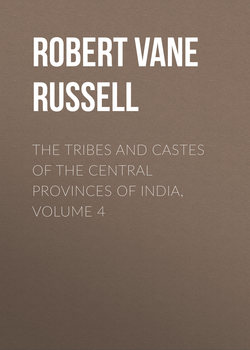Читать книгу The Tribes and Castes of the Central Provinces of India, Volume 4 - Robert Vane Russell - Страница 4
Part II
Articles on Castes and Tribes
Kumhār—Yemkala
Vol. IV
Kumhār
3. Social Customs
ОглавлениеGirls are married at an early age when their parents can afford it, the matches being usually arranged at caste feasts. In Chānda parents who allow a daughter to become adolescent while still unwed are put out of caste, but elsewhere the rule is by no means so strict. The ceremony is of the normal type and a Brāhman usually officiates, but in Betūl it is performed by the Sawāsa or husband of the bride’s paternal aunt. After the wedding the couple are given kneaded flour to hold in their hands and snatch from each other as an emblem of their trade. In Mandla a bride price of Rs. 50 is paid.
The Kumhārs recognise divorce and the remarriage of widows. If an unmarried girl is detected in criminal intimacy with a member of the caste, she has to give a feast to the caste-fellows and pay a fine of Rs. 1–4 and five locks of her hair are also cut off by way of purification. The caste usually burn the dead, but the Lingāyat Kumhārs always bury them in accordance with the practice of their sect. They worship the ordinary Hindu deities and make an offering to the implements of their trade on the festival of Deothān Igāras. The village Brāhman serves as their priest. In Bālāghāt a Kumhār is put out of caste if a dead cat is found in his house. At the census of 1901 the Kumhār was ranked with the impure castes, but his status is not really so low. Sir D. Ibbetson said of him: “He is a true village menial; his social standing is very low, far below that of the Lohār and not much above the Chamār. His association with that impure beast, the donkey, the animal sacred to Sitala, the smallpox goddess, pollutes him and also his readiness to carry manure and sweepings.” As already seen there are in the Central Provinces Sungaria and Gadheria subcastes which keep donkeys and pigs, and these are regarded as impure. But in most Districts the Kumhār ranks not much below the Barhai and Lohār, that is in what I have designated the grade of village menials above the impure and below the cultivating castes. In Bengal the Kumhārs have a much higher status and Brāhmans will take water from their hands. But the gradation of caste in Bengal differs very greatly from that of other parts of India.
